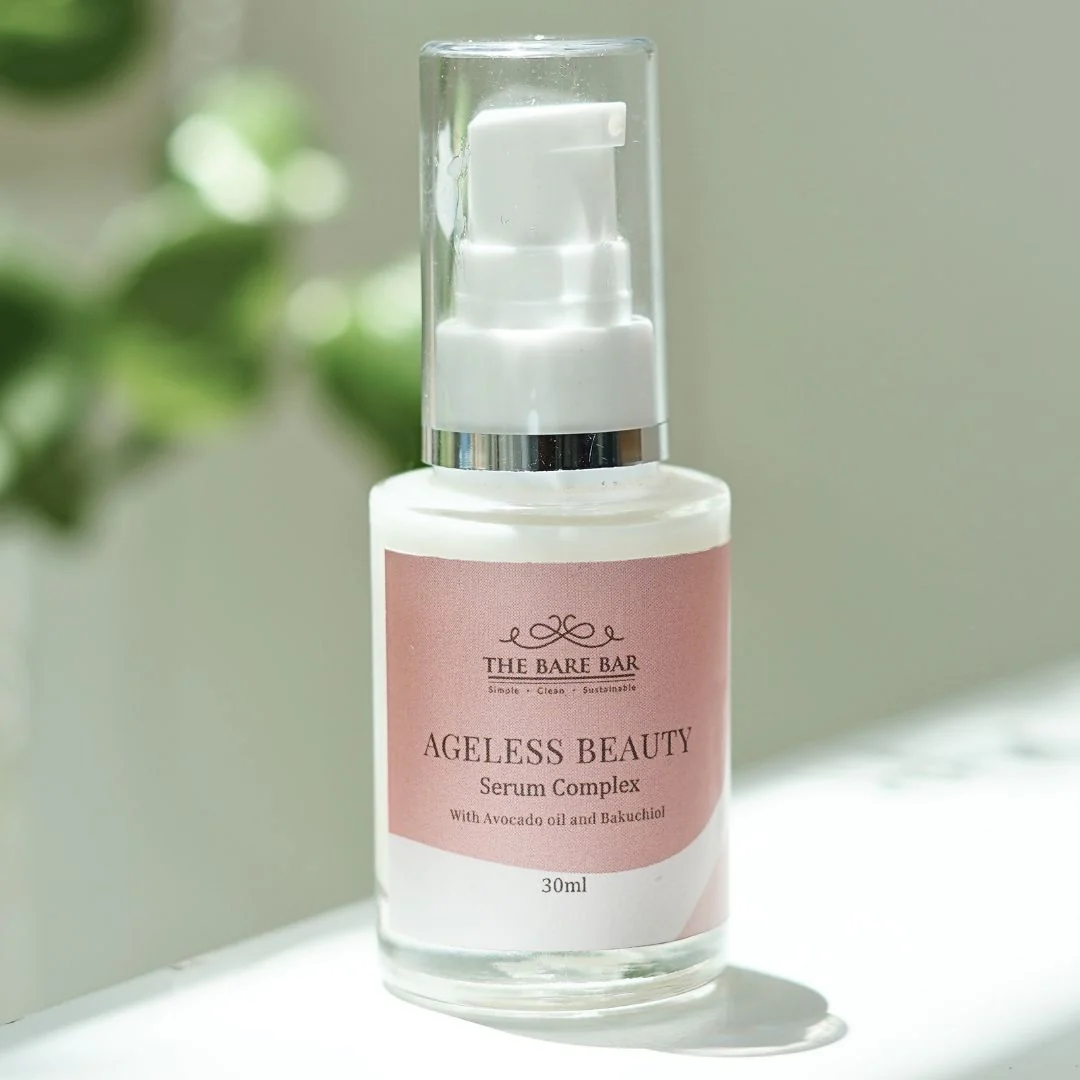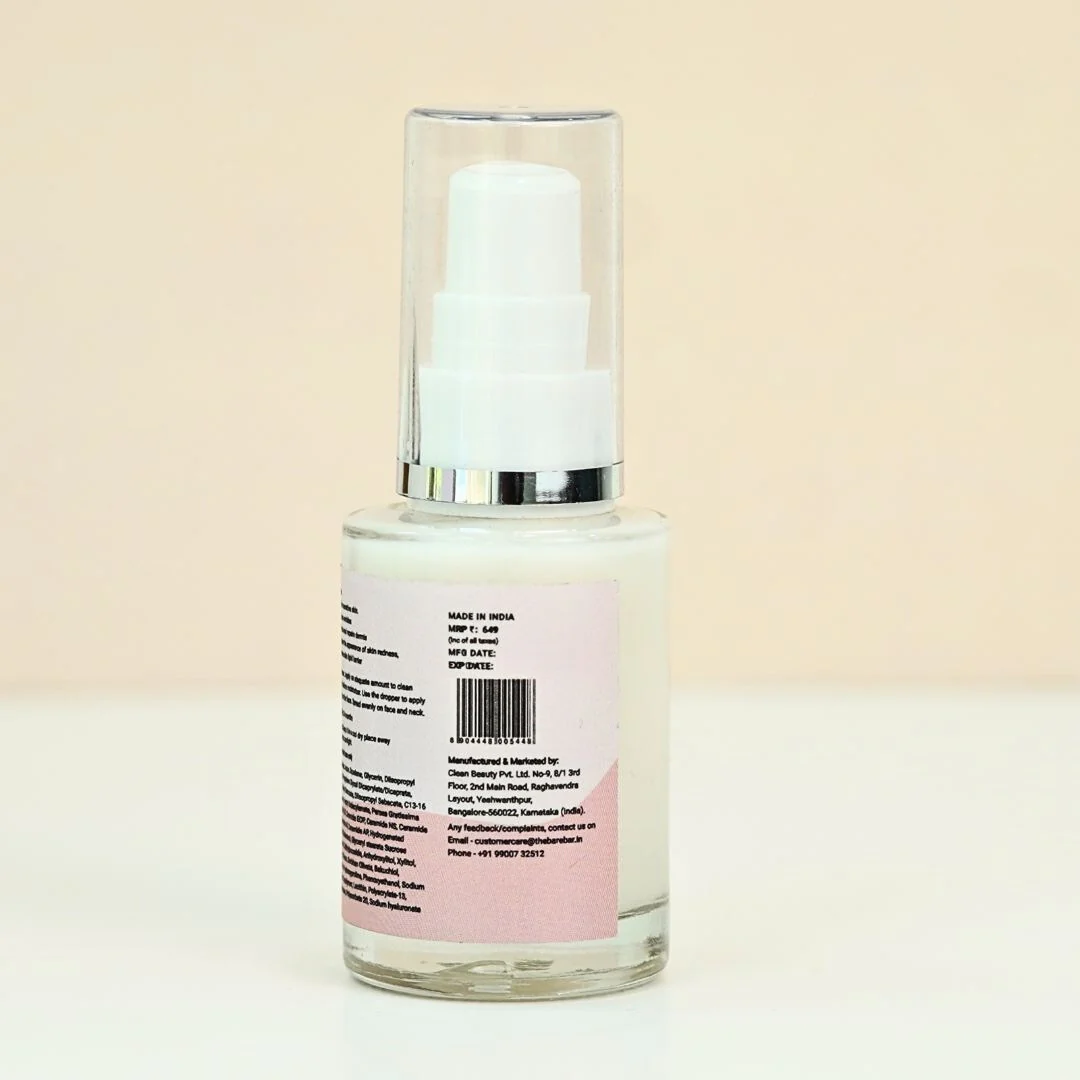Face care, Natural Personal Care
AGELESS BEAUTY SERUM COMPLEX
₹649.0
Benefits:
| 1. Safe for sensitive skin. 2. Reduces wrinkles 3. Protects and repairs dermis 4. Firming and moisturizing 5. Restores skin lipid barrier |
| Introducing our Ageless Beauty Serum Complex, a transformative blend infused with the nourishing power of Avocado oil and Bakuchiol. Designed with sensitive skin in mind, this serum offers a holistic approach to skincare. With skin-loving squalene, fortifying ceramide, and hydrating hyaluronic acid, each drop encapsulates a commitment to timeless radiance and rejuvenation. |
Benefits:
| 1. Safe for sensitive skin. 2. Reduces wrinkles 3. Protects and repairs dermis 4. Firming and moisturizing 5. Restores skin lipid barrier |
Ingredients:
| Aqua, Squalane, Glycerin, Diisopropyl Adipate, Propylene Glycol Dicaprylate/Dicaprate, C12-15 Alkyl Benzoate, Diisopropyl Sebacate, C13-16 Isoalkane, Heptyl Undecylenate, Persea Gratissima (Avocado) Oil, Ceramide EOP, Ceramide NS, Ceramide NP, Ceramide AS, Ceramide AP, Hydrogenated Lecithin Cholesterol, Glyceryl stearate Sucrose Distearate, Xylitylglucoside, Anhydroxylitol, Xylitol, Cetearyl Olivate, Sorbitan Olivate, Bakuchiol, Dipalmitoyl Hydroxyproline, Phenoxyethanol, Sodium Acrylates Copolymer, Lecithin, Polyacrylate-13, Polyisobutene, Polysorbate 20, Sodium hyaluronate |
You must be logged in to post a review.
Q & A
Ask a question
There are no questions yet
- Ingredients:
- Natural and Organic Ingredients: Serums made from natural and organic ingredients typically have a lower environmental impact compared to those made from synthetic chemicals. Organic farming practices avoid the use of harmful pesticides and fertilizers, which can reduce soil and water pollution.
- Sustainable Sourcing: Ingredients sourced sustainably ensure that the extraction process does not deplete natural resources or harm ecosystems.
- Production Process:
- Energy Efficiency: Manufacturing processes that use renewable energy sources or energy-efficient practices contribute to a lower carbon footprint.
- Waste Management: Companies that minimize waste during production, reuse by-products, and implement recycling practices enhance sustainability.
- Packaging:
- Recyclable or Biodegradable Packaging: Using packaging materials that are recyclable or biodegradable reduces environmental impact. Glass bottles, for example, can be recycled multiple times.
- Minimal Packaging: Reducing the amount of packaging material helps lower waste and the carbon footprint associated with transportation.
- Distribution:
- Local Sourcing: Sourcing ingredients locally reduces transportation emissions.
- Eco-friendly Transportation: Using transportation methods that emit less CO2, such as electric vehicles or shipping by sea instead of air, can significantly reduce the carbon footprint.
- Corporate Practices:
- Sustainability Initiatives: Companies with strong sustainability policies, such as carbon offset programs and commitments to reduce their overall environmental impact, contribute positively to the product's sustainability.
Carbon Footprint Considerations:
- Life Cycle Assessment (LCA):
- Conducting a full LCA helps in understanding the total carbon emissions from the product’s entire life cycle—from raw material extraction to production, distribution, usage, and disposal.
- Beauty serums with a lower carbon footprint would show lower emissions at each stage of the LCA.
- Renewable Energy Usage:
- Manufacturing facilities powered by renewable energy sources (solar, wind, etc.) will have a significantly lower carbon footprint compared to those relying on fossil fuels.
- Packaging Impact:
- The production and disposal of packaging materials contribute to the carbon footprint. Sustainable packaging options (like glass, biodegradable plastics, or reduced packaging) can mitigate this impact.
References:
- Natural and Organic Ingredients:
- "Organic agriculture and sustainable development" - Food and Agriculture Organization (FAO)
- Sustainable Sourcing:
- "Sustainable sourcing of natural ingredients" - United Nations Conference on Trade and Development (UNCTAD)
- Life Cycle Assessment:
- "Life Cycle Assessment: Principles and Practice" - Environmental Protection Agency (EPA)
- Renewable Energy in Manufacturing:
- "Renewable Energy in Manufacturing: A Policy Brief" - International Renewable Energy Agency (IRENA)
- Sustainable Packaging:
- "The Impact of Packaging on the Environment" - Environmental Action Group
No more offers for this product!
General Inquiries
There are no inquiries yet.



















Reviews
There are no reviews yet.